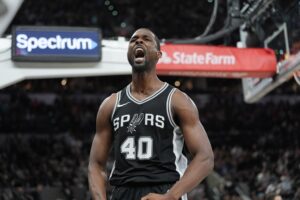Two years ago, the Boston Celtics were preparing to take out the defending Eastern Conference champions, the Cleveland Cavaliers; a feat they were just one game away from doing the year prior. Isaiah Thomas was coming off his best season as a professional and the city of Boston seemed to be fully behind Thomas after his heroic post-season play.
Then, on August 22, 2017, a Woj bomb (an Adrian Wojnarowski breaking news tweet) completely changed the course of the Eastern Conference. Boston traded Thomas to the Cleveland Cavaliers for Kyrie Irving (other players and picks were involved). Celtics fans were conflicted about how to feel. On one hand, they were welcoming a top five-point guard at the beginning of his prime, and coming off multiple NBA Finals appearances. On the other hand, they lost the player that carried them throughout the playoffs.
Fast-forward to now, the Boston Celtics find themselves with neither point guard putting on the green and white. Instead, a player from the Bronx, NY, listed at 6’1” and 184 pounds, is taking over the position. Although he is joining a historic franchise, Kemba Walker will write his own story in Boston.
A New Chapter for Kemba Walker and the Boston Celtics
Kemba Walker’s Fit with the Boston Celtics
Walker played his first eight seasons with the Charlotte Hornets, a place he wanted to finish his career. Michael Jordan and the Hornets reportedly offered him a five-year, $160 million contract; although he was eligible for a five-year, $221 million contract. Further proving the organization didn’t value Walker and pushing him out the door. Despite moving teams, he showed his loyalty by giving the Hornets every opportunity to re-sign him, a trait the Boston faithful love about their players, e.g. Tom Brady, David Ortiz, Patrice Bergeron, Larry Bird, among others.
Offensive Fit
Ball Movement
In 2016-17 (pre-Kyrie Irving), starting Boston Celtics point guard, Isaiah Thomas, averaged 56.2 passes per game and 5.8 assists in wins (per NBA.com/stats). In comparison, Walker averaged 56.3 passes per game and 6.6 assists in 39 wins, during the 2018-19 season. The Celtics play their best basketball when the ball is moving, a concept that took a fall over the past two seasons.
During the Irving era, the Celtics averaged approximately 17 fewer passes than the Thomas led teams. And when comparing that to the 2018-19 Charlotte Hornets, they averaged a whopping 35 fewer passes. Coach Brad Stevens and his continuity offense will thrive with Walker at the helm.
Shooting
In three seasons with the Celtics, Isaiah Thomas shot 37 percent from three-point territory on seven attempts per game. With a high volume of three-point attempts, Thomas had an effective field goal percentage (eFG%) of 52 percent (factors in three-point makes being worth more). In two seasons with the Celtics, Irving shot 40 percent from three-point territory on nearly seven attempts per game and had an eFG percentage of 56 percent.
Both Irving and Thomas shot the ball well in Boston on high volume shooting. Walker will step in and be able to recreate the same efficient shooting. Over his career, he has shot 36 percent from the three-point line on six attempts per game and has an eFG percentage of 48 percent.
Finishing
Last season, according to NBA.com/stats, Walker attempted roughly 34 percent of his shots from less than 10-feet; on those attempts, he shot 51 percent. The Celtics predicate their offense on collapsing the defense for open threes and/or secondary attacks. If the point guard or main ball handler is unable to collapse the defense on drives, the offense will stall.
The Celtics offense stalled a lot when their second unit was on the floor, in large part, due to Terry Rozier’s inefficiencies around the rim. Rozier only took 29 percent of his shots from less than 10 feet, which totaled out to less than three per game. And, of those attempts, he shot less than 50 percent. The defense felt comfortable daring Rozier to drive to the rim without helping off shooters.
Walker will immediately impact the offense with his ability to drive the ball and collapse the defense. In one-minute more of game action per game, Walker averaged approximately four more drives (15.2 vs 11.4) than Irving, which ranked him seventh among guards who played at least half the season.
Defense
Neither Isaiah Thomas, Kyrie Irving, or Kemba Walker are known for their defensive prowess. However, Walker has proven his ability to be a positive defender. Last season, he defended nearly 13 shot attempts per game and held the opponent to 44 percent field goal shooting, a full percent better than the league average.
The Celtics have comprised a team full of solid wing defenders that are able to switch most screening actions. With this defensive flexibility, Walker will fit in seamlessly to their defensive scheme.
Overall
Kemba Walker is the perfect fit for the Boston Celtics. He brings the toughness Isaiah Thomas brought for three seasons, along with the endless offensive repertoire similar to Kyrie Irving. Add in his ability to move the ball and break down defenders, Walker will be a welcomed sight to the Boston faithful. They should expect an All-Star season out of him and a deep playoff run. This will be just the start of Kemba Walker’s story with the Boston Celtics.
Main Photo
Embed from Getty Images






